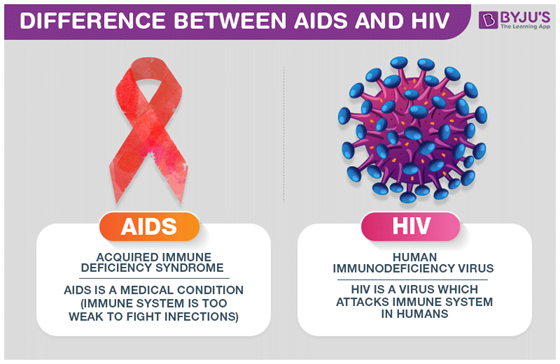The terms HIV and AIDS are often used interchangeably. However, they are completely different from each other. AIDS is an immunodeficiency disease, whereas HIV is the virus causing it.
The difference between AIDS and HIV might seem quite inconspicuous due to the lack of awareness about the disease. Let us have an overview of the difference between HIV and AIDS in detail.
AIDS vs HIV
Following are the important difference between AIDS and HIV:

| AIDS | HIV |
| Acquired Immunodeficiency Syndrome (AIDS) is a disease. | Human Immunodeficiency Virus (HIV) is the causal factor (reason) for AIDS |
| Complications and secondary infections from this disease kill the host. | The virus is incapable of killing a host by itself. |
| AIDS is a condition acquired only after the contraction of HIV. | HIV is a virus and, like other viruses, can spread from person to person. |
What Is HIV?
HIV stands for Human Immunodeficiency Virus. It is the virus that leads to acquired immunodeficiency syndrome, or AIDS, if not treated. Unlike some other viruses, the human body can’t get rid of HIV completely, even with proper treatment. So once you get HIV, you have it for life.
What Is AIDS?
AIDS is the most severe phase of HIV infection. People with AIDS have completely damaged immune systems, which may also result in an increasing number of severe diseases, called opportunistic infections.
To Summarize
- Acquired Immunodeficiency Syndrome (AIDS) is a chronic, potentially life-threatening disease caused by the virus (HIV).
- The disease does not kill a person by itself. It weakens your immune system and makes it very easily prone to infections and other secondary diseases.
- These secondary infections can cause serious complications which can lead to the death of an immuno-compromised patient.
- Having AIDS these days is not a death sentence anymore. There are treatments and medications that allow an infected person to lead an almost normal life.
Stay tuned to know more in detail about the difference between AIDS and HIV only at BYJU’S Biology
Frequently Asked Questions
What is HIV?
HIV (Human Immunodeficiency Virus) is a virus that infects the immune system, decreasing its ability to fight off other infections and diseases.
How Is HIV Transmitted?
HIV can be transmitted only through specific activities including:
- Having unprotected sex,
- Transmission of infected blood,
- Sharing infected needles or other sharp instruments,
- From a mother to her baby during pregnancy, childbirth, and breastfeeding.
What Are the Stages of HIV Infection?
HIV can be transmitted only through specific activities including:
There are three stages of HIV infection:
- Acute HIV infection
- Clinical latency
- AIDS – Acquired Immunodeficiency Syndrome.
What are the early symptoms of HIV infection?
People affected with an HIV infection often feel like they have the flu. Other early symptoms include:
- Fever
- Fatigue
- Headaches
- Swollen lymph nodes in the neck and groin area
What are the treatments for HIV?
There are more than 25 drugs available and approved to treat HIV-infected patients. These drugs are called antiretroviral drugs and are a combination of medications, which are collectively called antiretroviral therapy, or ART.
List out the different types of the human immunodeficiency virus (HIV)?
There are two main types of Human Immunodeficiency Virus (HIV) – HIV-1 and HIV-2. Both can lead to AIDS and are very different from each other.


Comments